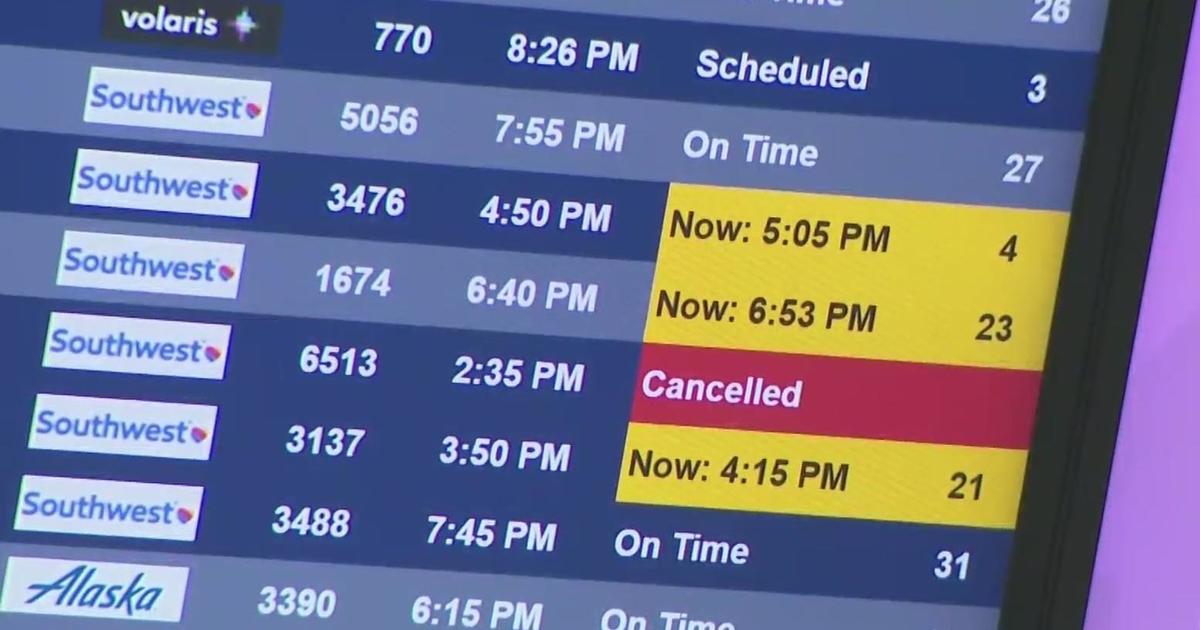Feds vs. Google: Bay Area Tech Giant's Search Policies Target Of Justice Department Antitrust Case
WASHINGTON (CBS SF/AP) — The Justice Department sued San Francisco Bay Area tech giant Google Tuesday, claiming the company has been abusing its dominance in online search to stifle competition and harm consumers.
The litigation marks the government's most significant act to protect competition since its groundbreaking case against Microsoft more than 20 years ago. The suit could be an opening salvo ahead of other major government antitrust actions, given ongoing investigations of major tech companies including Apple, Amazon and Facebook at both the Justice Department and the Federal Trade Commission.
"Those four companies have antitrust issues, and they're all going to face cases," John Blank, Zacks Investment Research. "And so today's Alphabet antitrust case, more than likely will be the beginning volley for those four companies."
GOOGLE DOCUMENTS
- Read The Federal Antitrust Lawsuit Against Google
- Google Antitrust Case Background
- US Attorney General's Comments On Case
New York Attorney General Letitia James warned the tech giant more legal woes may be on the way. Attorneys general from New York, Colorado, Iowa, Nebraska, North Carolina, Tennessee, and Utah have been conducting their own investigations.
"This is a historic time for both federal and state antitrust authorities, as we work to protect competition and innovation in our technology markets," James said in a press release. "We plan to conclude parts of our investigation of Google in the coming weeks. If we decide to file a complaint, we would file a motion to consolidate our case with the DOJ's. We would then litigate the consolidated case cooperatively, much as we did in the Microsoft case."
Lawmakers and consumer advocates have long accused Google, whose corporate parent Alphabet Inc. has a market value just over $1 trillion and is headquartered in Mountain View, of abusing its dominance in online search and advertising to stifle competition and boost its profits. Critics contend that multibillion-dollar fines and mandated changes in Google's practices imposed by European regulators in recent years weren't severe enough and that structural changes are needed for Google to change its conduct.
The case is expected to be filed in federal court in Washington, D.C., and will allege Google has been abusing its dominance in online search to stifle competition and harm consumers, the person familiar with the matter told the AP. It will also allege that Google uses billions of dollars collected from advertisers to payphone manufacturers to ensure Google is the default search engine on browsers, the person said. The person could not discuss the matter publicly before a formal announcement expected later Tuesday morning and spoke to the AP on the condition of anonymity.
The Trump administration has long had Google in its sights. A top economic adviser to President Donald Trump said two years ago that the White House was considering whether Google searches should be subject to government regulation. Trump has often criticized Google, recycling unfounded claims by conservatives that the search giant is biased against conservatives and suppresses their viewpoints, interferes with U.S. elections and prefers working with the Chinese military over the Pentagon.
Google controls about 90% of global web searches. The company has been bracing for the government's action and is expected to fiercely oppose any attempt to force it to spin off its services into separate businesses.
The company, based in Mountain View has long denied the claims of unfair competition. Google argues that although its businesses are large, they are useful and beneficial to consumers. It maintains that its services face ample competition and have unleashed innovations that help people manage their lives.
Most of Google's services are offered for free in exchange for personal information that helps it sell its ads. Google insists that it holds no special power forcing people to use its free services or preventing them from going elsewhere.
"And that is what the DOJ is saying is bad - that, yes, people have a choice, sort of, but you're being steered to choose Google," said CNet analyst Shara Tibken. "There's really kind of this reckoning going on with tech, you know, for a long time it was kind of this like great thing, it was changing our lives, everybody thought favorably about the tech industry. There's kind of been a shift, we're realizing the control that they have, you know, and this is causing government bodies to look into it."
A recent report from a House Judiciary subcommittee, following a year-long investigation into Big Tech's market dominance, concluded that Google has monopoly power in the market for search. It said the company established its position in several markets through acquisition, snapping up successful technologies that other businesses had developed — buying an estimated 260 companies in 20 years.
The argument for reining in Google has gathered force as the company stretched far beyond its 1998 roots as a search engine governed by the motto "Don't Be Evil." It's since grown into a diversified goliath with online tentacles that scoop up personal data from billions of people via services ranging from search, video and maps to smartphone software. That data helps feed the advertising machine that has turned Google into a behemoth.
The company owns the leading web browser in Chrome, the world's largest smartphone operating system in Android, the top video site in YouTube and the most popular digital mapping system. Some critics have singled out YouTube and Android as among Google businesses that should be considered for divestiture.
With only two weeks to Election Day, the Trump Justice Department is taking bold legal action against Google on an issue of rare bipartisan agreement. Republicans and Democrats have accelerated their criticism of Big Tech in recent months, although sometimes for different reasons. It's unclear what the status of the government's suit against Google would be if a Joe Biden administration were to take over next year.
The Justice Department sought support for its suit from states across the country that share concerns about Google's conduct. A bipartisan coalition of 50 U.S. states and territories, led by Texas Attorney General Ken Paxton, announced a year ago they were investigating Google's business practices, citing "potential monopolistic behavior."
© Copyright 2020 CBS Broadcasting Inc. All Rights Reserved. The Associated Press contributed to this report.
Kiet Do contributed to this report.



